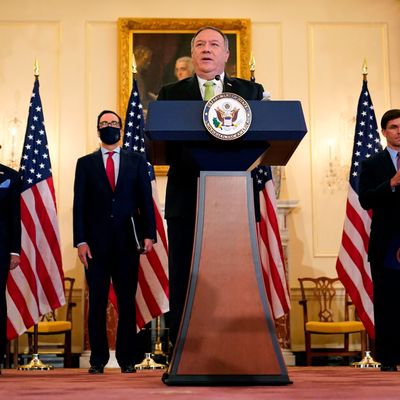
Secretary of State Mike Pompeo appears to be promoting President Trump’s agenda in visits to battleground states, an unprecedented use of the office for partisan politics, that comes just 40 days ahead of the election. While the appearances are billed as routine federal business, the venues and blatant political undertones in Pompeo’s remarks make them seem an awful lot like campaign events. Most recently, Pompeo traveled to Wisconsin — a key swing state in the 2020 race — to address Republican lawmakers about U.S. policy toward China. “The Trump administration is fighting to protect our wallets, hearts, minds, and our freedoms,” Pompeo said in his speech. “Democrat or Republican, you have a friend in the Trump administration to help you push back against the [Chinese Community Party’s] exploitation of our open society.”
While the secretary of State traditionally avoids participating in domestic politics, Pompeo’s Wisconsin visit was his fourth such event this month, according to the Associated Press. During his tenure, Pompeo has regularly flouted restrictions that former secretaries of State observed in an effort to comply with the Hatch Act, which prohibits federal employees from engaging in political activities. And Pompeo isn’t the only Trump official making trips to swing states recently; other agency heads like Interior Secretary David Bernhardt and Environmental Protection Agency chief Andrew Wheeler have made similar trips this year to announce federal aid or advocate for Trump initiatives supposedly benefitting the local economy. The top diplomat’s behavior stands out, however, as he has less reason to be frequenting swing states — though Pompeo doesn’t see it that way. The AP notes, “Pompeo and his aides have denied any wrongdoing and defended his appearances as part of explaining foreign policy and the State Department’s role to the American people.”
Pompeo himself referenced the statutory limits of the Hatch Act last Sunday, while speaking to white Evangelicals at a congregation in Texas, only to continue with a political message. “As secretary of State I’m not allowed to do politics, but I can do duty, and it is everyone’s duty to be counted, to stand up and express your preference, the things that you want, and to go to the polling place and exercise that freedom that we have been given,” he said, telling the audience to “go exercise that right and make sure every one of your friends does the same, and then the Lord will pass upon it and we will come out of this election a stronger, better nation.”
Using such speeches to showcase his boss’s achievements and agenda may be rooted in the secretary’s own political aspirations, a suspicion held by Democrats in Washington, who see Pompeo’s actions as preparation for a potential 2024 presidential bid. “Campaigning for President Trump with taxpayer resources is just the latest example of Secretary Pompeo’s willingness to break the law and put his political interest above our national interest,” Representative Joaquin Castro told The Hill.
It’s not the first time that Pompeo has blurred the line between Trump surrogate and chief U.S. diplomat. House Democrats are investigating whether Pompeo violated the Hatch Act with his speech at the Republican National Convention, an address he prerecorded from Jerusalem while on official diplomatic travel. The Hill has more on the investigation:
Pompeo has said that the State Department’s legal team cleared him to make the speech from Jerusalem and that he did so in his personal capacity and not as secretary of State — which critics see as a distinction without a difference. Democrats are working to see what government resources were used as part of his participation, such as the federal flight to Israel and his use of diplomatic security while recording his remarks.
Hatch Act violations have become somewhat routine in the Trump era, and the White House has largely shrugged off these transgressions. According to the Office of Special Counsel, the independent agency that investigates potential violations, at least 12 Trump senior officials have broken the law, and most have not seen penalties beyond a warning letter. Just this week, Education Secretary Betsy DeVos came under investigation for criticizing Joe Biden in a Fox News interview; the clip was also promoted through official Education Department channels. “Depending on what OSC finds, she would be the second member of the Trump Cabinet to be found to have violated the law,” Politico reported. “Only one case, that of former senior counselor Kellyanne Conway, was sent to President Donald Trump for action, and he didn’t act on it.”






























